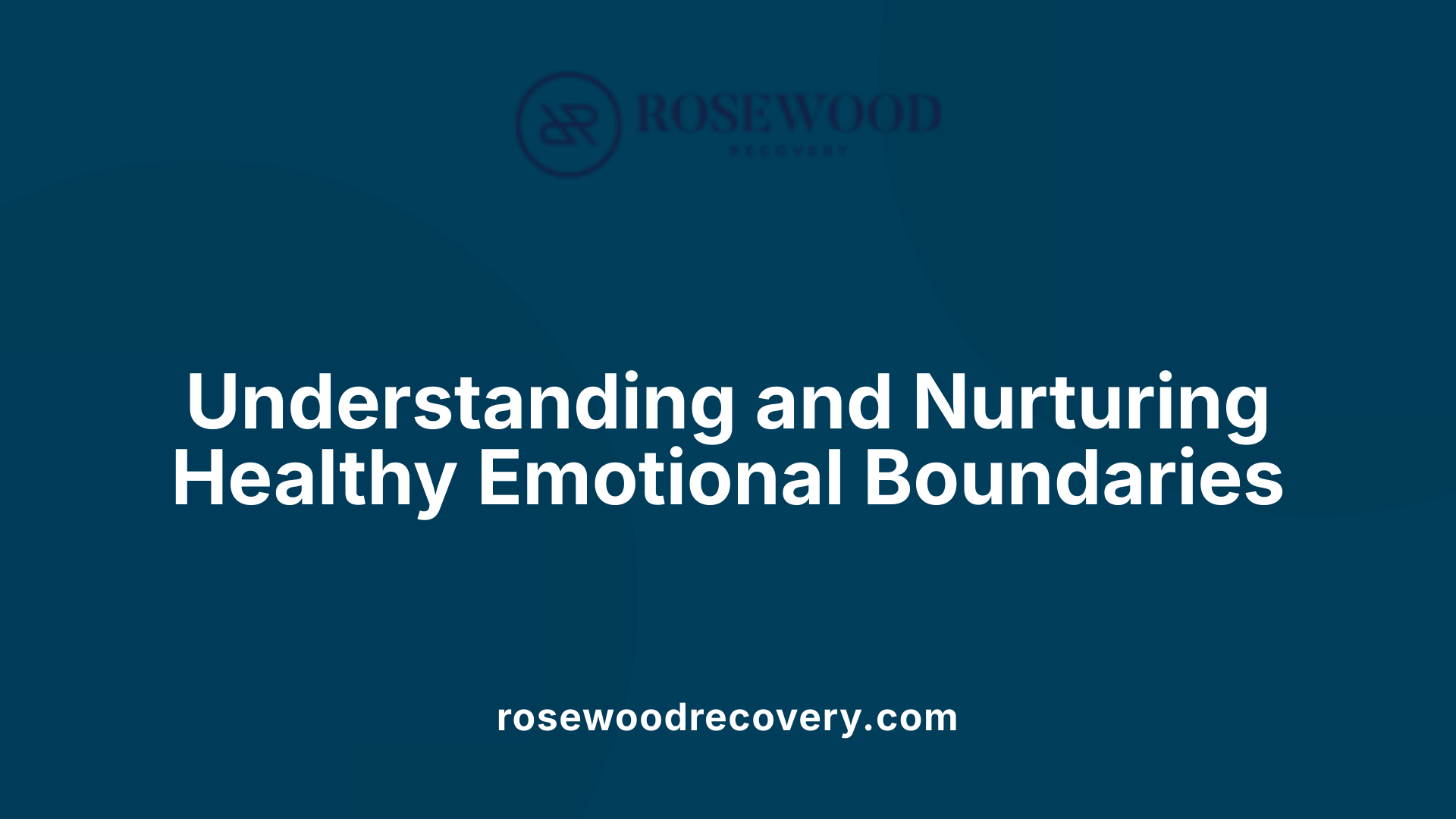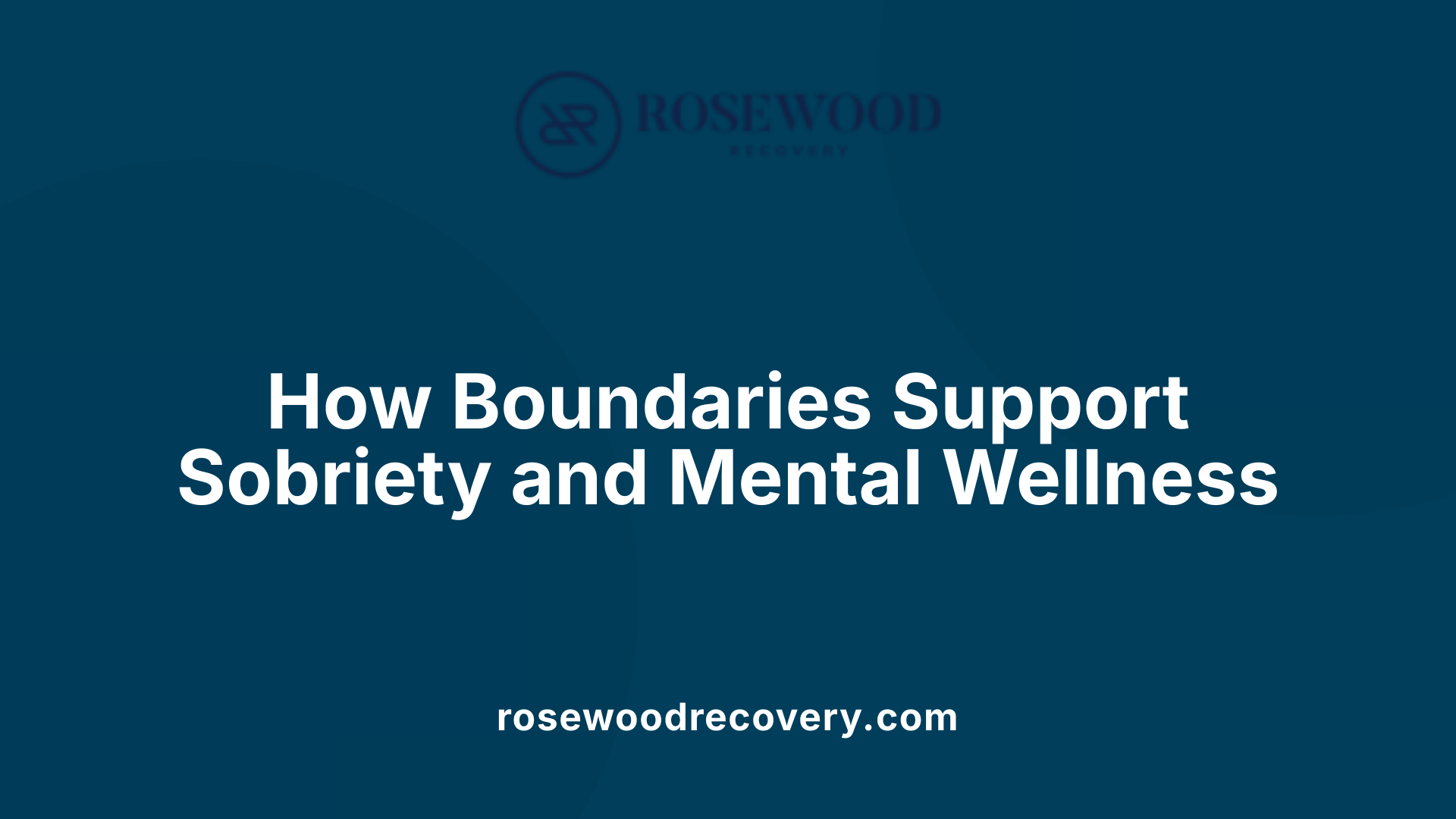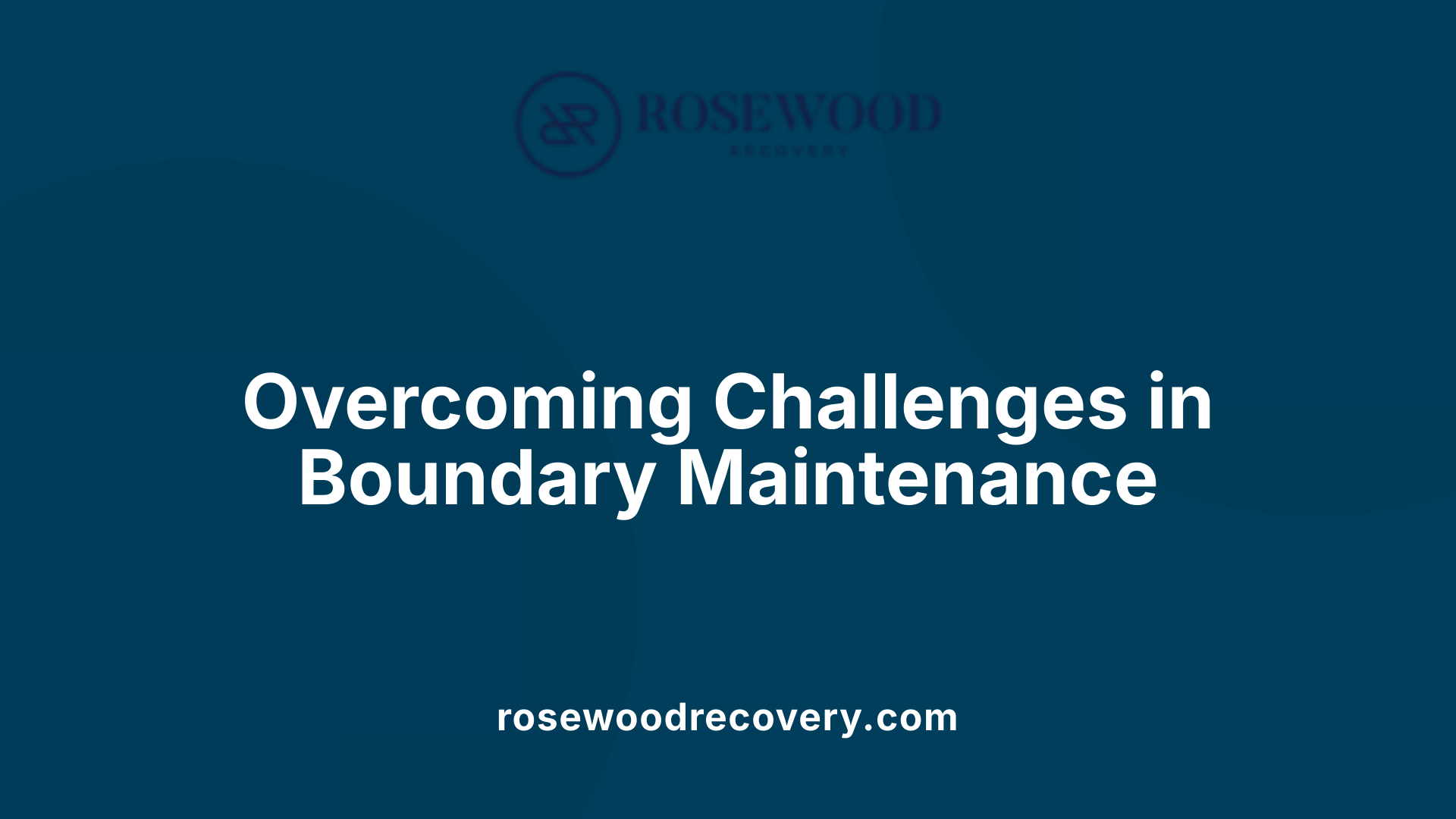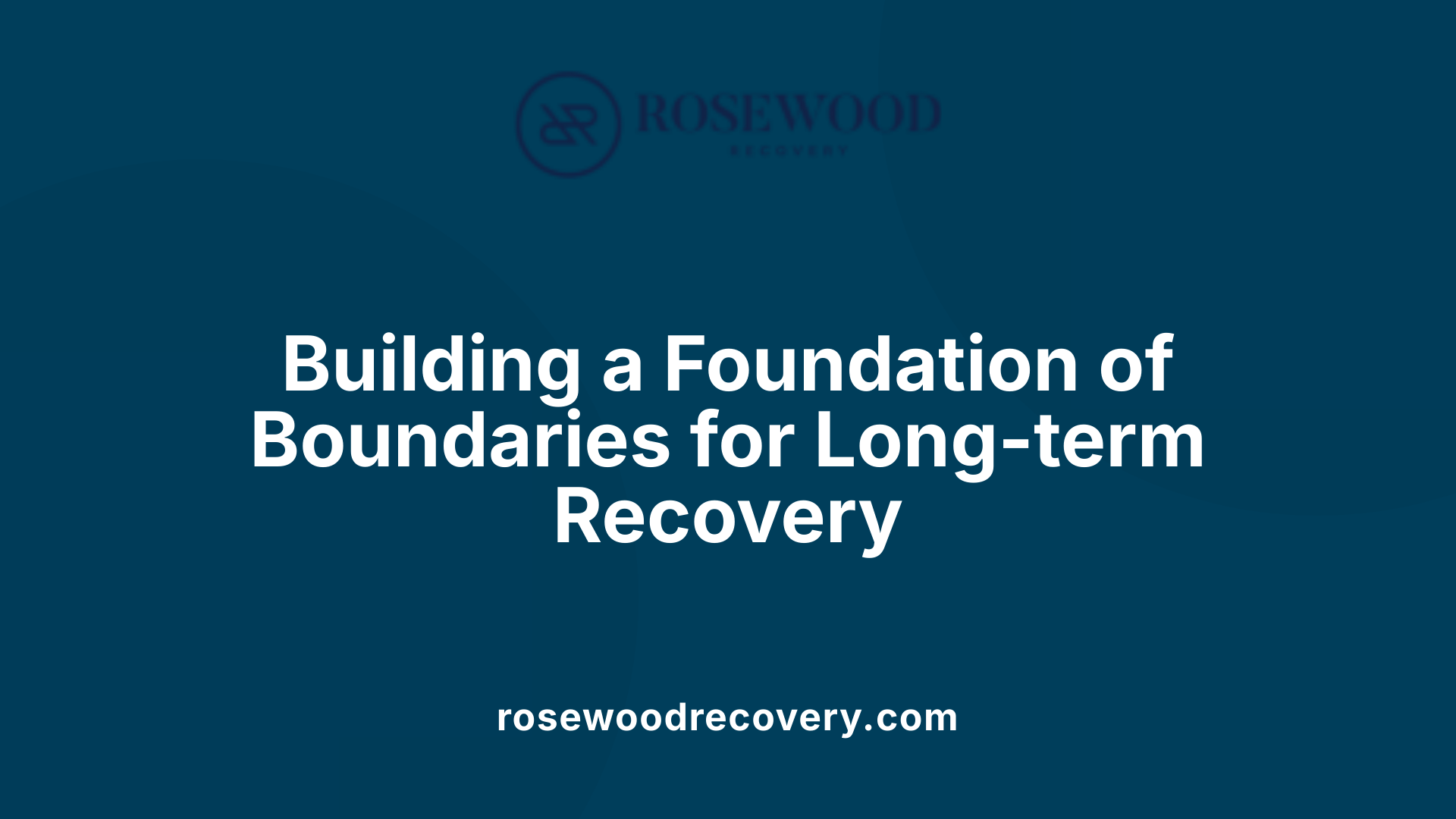Understanding the Foundation of Emotional Safety
Embarking on a recovery journey involves more than just abstaining from substances; it requires the establishment of healthy emotional boundaries. These boundaries serve as invisible fences that protect your mental, emotional, and physical well-being. Recognizing and setting appropriate boundaries is crucial for maintaining sobriety, fostering respectful relationships, and nurturing personal growth. This article explores what healthy emotional boundaries are, why they are vital in recovery, and practical strategies to implement them effectively.
What Are Healthy Emotional Boundaries and Their Significance in Recovery

What are healthy emotional boundaries and why are they important in recovery?
Healthy emotional boundaries are personal limits that individuals establish to protect their emotional health and foster respectful, genuine relationships. These boundaries help define what is acceptable and unacceptable in interactions with others, ensuring that feelings and needs are respected.
In the context of recovery, setting emotional boundaries is crucial. They serve as a safeguard against emotional overload, resentment, and stress. By recognizing that emotions are personal and managing how much and what kind of emotional sharing is appropriate, individuals can maintain their mental well-being.
These boundaries enable people in recovery to preserve their emotional resources, practice self-care, and stay focused on their healing journey. They promote emotional independence by encouraging trust in oneself and others, reducing feelings of guilt or obligation to please everyone.
Furthermore, healthy emotional boundaries foster clarity in relationships, helping to prevent manipulation and unhealthy dependence. They allow individuals to communicate their feelings honestly and assertively, which strengthens self-awareness and respect.
Overall, establishing emotional boundaries is a vital part of recovery. It supports emotional stability, nurtures self-esteem, and creates a safe environment for growth and healing, ultimately contributing to long-term sobriety and mental wellness.
The Role of Boundaries in Supporting Sobriety and Mental Wellness

How do healthy boundaries support sobriety and mental health during recovery?
Healthy boundaries are essential tools that bolster both sobriety and mental well-being throughout the recovery journey. They serve multiple functions, such as shielding individuals from relapse triggers, managing stress, and fostering a sense of self-care.
By setting clear limits on relationships, environments, and behaviors, boundaries help prevent exposure to substances and situations that could lead to relapse. For example, avoiding environments where drugs or alcohol are present reduces temptation and reinforces commitment to sobriety.
Moreover, boundaries promote respect and safety in relationships, ensuring interactions remain supportive and free from manipulation or toxicity. They clarify personal needs and limits, which enhances self-awareness and self-esteem. This self-knowledge boosts emotional resilience, helping individuals recognize and respond to triggers effectively.
Establishing boundaries also supports mental health by reducing emotional overload, preventing burnout, and encouraging self-responsibility. Techniques such as assertive communication and seeking support from recovery groups or therapists make the process more manageable.
Overall, boundaries act as a foundation for sustained recovery. They provide a sense of control, promote respectful relationships, and foster emotional stability, all vital for maintaining sobriety and mental wellness over the long term.
Practical Strategies for Setting and Enforcing Boundaries
 Establishing healthy boundaries during recovery is crucial for protecting your sobriety and emotional well-being. To start, you should identify your personal needs and limits. Reflect on what makes you feel safe and supported, whether it’s physical space, emotional boundaries, or managing your time effectively.
Establishing healthy boundaries during recovery is crucial for protecting your sobriety and emotional well-being. To start, you should identify your personal needs and limits. Reflect on what makes you feel safe and supported, whether it’s physical space, emotional boundaries, or managing your time effectively.
Once you know your boundaries, communicating them clearly and assertively is vital. Use "I" statements to express your needs without sounding accusatory, such as, "I need to avoid environments with substances to stay on track." This honest approach helps others understand and respect your limits.
Seeking support from trusted individuals like peers, sponsors, or therapists can reinforce your efforts. They can offer guidance, encouragement, and accountability as you practice setting boundaries. Remember, consistency matters—enforce your boundaries by following through with appropriate consequences if they are crossed. Regularly re-evaluate your boundaries to ensure they still serve your recovery goals.
Finally, protect yourself from toxic influences and triggers. Avoiding social media or relationships that undermine your progress helps maintain focus. Building resilience in boundary-setting is an ongoing process that fosters self-respect, supports your recovery journey, and encourages healthier relationships.
Recognizing and Overcoming Challenges in Boundary Maintenance

What challenges might arise when maintaining emotional boundaries during recovery, and how can they be addressed?
During recovery, maintaining emotional boundaries can be particularly demanding. Individuals often find it difficult to say no or may feel guilty for setting limits, especially when surrounded by well-meaning but boundary-violating loved ones or friends. This can lead to emotional exhaustion, increased stress, or even relapse if boundaries are not respected or enforced.
Another common challenge is resisting manipulation or pressure from toxic individuals who may disregard personal limits to get what they want. Such situations can make individuals feel overwhelmed or confused about their needs and rights.
To address these difficulties, it’s vital to first clearly identify personal emotional needs. Communicating boundaries assertively yet respectfully using ‘I’ statements helps others understand and respect one's limits. For example, saying, “I need to focus on my recovery and cannot discuss certain topics” sets a clear tone.
Seeking support from trusted sources plays a crucial role. This can include friends, sponsors, therapists, or support groups that reinforce healthy boundary setting. Mindfulness practices, such as meditation or deep breathing, assist in recognizing emotional triggers early, enabling healthier responses.
Regularly reaffirming boundaries and practicing self-compassion nurtures self-respect and confidence. It reminds individuals that their feelings and limits are valid. Furthermore, periodic review of boundaries allows adjustments according to evolving needs and circumstances.
Enforcing boundaries consistently creates a protective barrier against relapse triggers and toxic influences, helping maintain emotional health and supporting long-term recovery. Recognizing these challenges and employing effective strategies empowers individuals to uphold their well-being on their recovery journey.
The Different Types of Boundaries Relevant to Recovery
What are the different types of boundaries relevant to recovery?
In recovery, establishing clear boundaries is crucial for creating a safe and nurturing environment that supports sobriety and well-being. These boundaries are varied and serve specific functions, including physical, emotional, mental, digital, and time boundaries.
Physical boundaries involve respect for personal space, body autonomy, and possessions. For example, removing alcohol or triggers from your environment protects you from temptation. Respecting personal space and limits on physical contact also fall under this category.
Emotional boundaries relate to managing feelings, recognizing emotional limits, and avoiding manipulation or emotional exhaustion. This includes saying no to emotional overload, especially from toxic relationships, and honoring your feelings without guilt.
Mental boundaries focus on protecting your thoughts, morals, and values. They help you stay aligned with your personal beliefs by avoiding behaviors or conversations that conflict with your recovery goals. Setting internal boundaries also includes exercises like self-discipline and accountability.
Digital boundaries involve regulating your online presence. Limiting exposure to triggering social media content or online interactions that threaten sobriety helps reduce the risk of relapse. It also involves setting limits on digital device use to avoid mental overload.
Time boundaries are about effectively managing your schedule. Prioritizing recovery activities such as support groups, therapy sessions, and self-care routines helps establish a routine that reinforces sobriety while preventing overcommitment and exhaustion.
Including these boundaries in your recovery process fosters a sense of self-respect, reduces stress, and maintains focus on your healing journey. They act as invisible fences that protect your mental, emotional, and physical health.
Below is a summary table illustrating these boundary types:
| Boundary Type | Examples | Functions |
|---|---|---|
| Physical | Removing triggers, respecting personal space | Protects body and physical environment |
| Emotional | Saying no to emotional overload, limiting sharing | Protects feelings and emotional energy |
| Mental | Aligning actions with personal morals, self-discipline | Maintains mental clarity and integrity |
| Digital | Limiting social media exposure, online interactions | Reduces triggers, manages mental overload |
| Time | Scheduling recovery activities, saying no to overcommitment | Ensures time for self-care and support |
Establishing these boundaries—and enforcing them consistently—helps individuals build resilience, foster healthier relationships, and achieve lasting recovery.
The Importance of Boundaries in Building a Sustainable Recovery

Why are boundaries important in addiction recovery?
Boundaries are a vital component of a successful recovery process because they serve as personal safeguards that protect your well-being. They help prevent exposure to relapse triggers by defining what is acceptable and what is not, such as avoiding environments or relationships that could lead to substance use.
By establishing clear physical, emotional, and mental limits, individuals create a safe space where they can focus on healing. These boundaries support effective communication, allowing individuals to express their needs and feelings honestly without fear of judgment or rejection.
Healthy boundaries also foster respectful and genuine relationships. They help rebuild trust and accountability, which are essential for long-term growth. Moreover, setting boundaries encourages self-respect and boosts confidence, empowering individuals to prioritize self-care and maintain their core values.
Despite challenges, maintaining boundaries helps reduce stress and prevents feelings of guilt or resentment. They serve as a protective framework, ensuring that recovery remains focused, safe, and sustainable. Ultimately, boundaries are crucial in promoting resilience, supporting sobriety, and fostering a supportive environment for continued personal development.
Long-term Benefits: The Impact of Embracing Healthy Boundaries
Establishing and maintaining healthy boundaries during recovery plays a crucial role in achieving long-lasting stability and resilience. These boundaries create a protective environment that safeguards individuals from potential setbacks by minimizing exposure to triggers and toxic influences. When physical, emotional, or mental limits are clearly communicated and respected, individuals feel more in control of their recovery journey.
Healthy boundaries also foster emotional independence, allowing individuals to rely on internal resources rather than external validation. This fosters a sense of self-worth and confidence, which are essential for building a positive self-image and maintaining sobriety over time.
Furthermore, setting boundaries enhances the quality of relationships. Supportive and respectful interactions promote mutual understanding, reduce chaos, and prevent codependency or manipulation. When individuals learn to prioritize their needs and communicate assertively, they build healthier connections that support ongoing growth.
| Aspect | Benefit | Explanation |
|---|---|---|
| Resilience | Greater ability to withstand challenges | Boundaries empower individuals to handle stress and setbacks effectively |
| Emotional Stability | Enhanced self-control and peace | Clear limits prevent emotional overload and burnout |
| Self-Worth | Increased confidence and respect | Consistently enforcing boundaries affirms personal value |
| Relationship Quality | Supportive and respectful relationships | Boundaries set expectations, fostering trust |
By recognizing the importance of boundaries, individuals can develop their capacity for self-care, emotional regulation, and responsible decision-making. This ongoing practice helps create a sustainable recovery, fostering resilience and emotional health well beyond initial sobriety phases.
Support from therapy, support groups, and trusted loved ones can reinforce boundary-setting skills, further promoting long-term success. Ultimately, embracing healthy boundaries becomes a foundation for a stable, joyful, and fulfilling life during and after recovery.
Building a Foundation for Lasting Sobriety
Establishing and maintaining healthy emotional boundaries is not a one-time task but an ongoing process that underpins a successful recovery journey. These boundaries serve as a protective framework that safeguards your emotional health, reinforces your self-worth, and fosters respectful relationships. By clearly recognizing and communicating your needs and limits, you set the stage for a sustainable lifestyle free from triggers and toxic influences. Embracing boundaries enables sustained resilience, emotional independence, and authentic connections, all vital components for long-term sobriety and overall wellness. Remember, self-love, patience, and support are key in this continual process of growth, making boundaries not just a recovery tool but a foundation for a healthier, more fulfilling life.
References
- What do healthy boundaries look like in recovery? - MHA Screening
- Boundaries in Addiction Recovery - Hazelden Betty Ford Foundation
- 4 Types of Boundaries in Recovery - Bradford Health Services
- Types Of Boundaries In Addiction Recovery - The Estate at River Bend
- The Importance of Setting Boundaries in Recovery - Bold Health
- Staying Grounded: Healthy Boundaries in Addiction Recovery
- Setting Healthy Boundaries In Addiction Recovery
- Why Healthy Boundaries Are So Important in Recovery
- The Importance of Healthy Boundaries in Addiction Recovery

.jpeg)
.jpeg)

